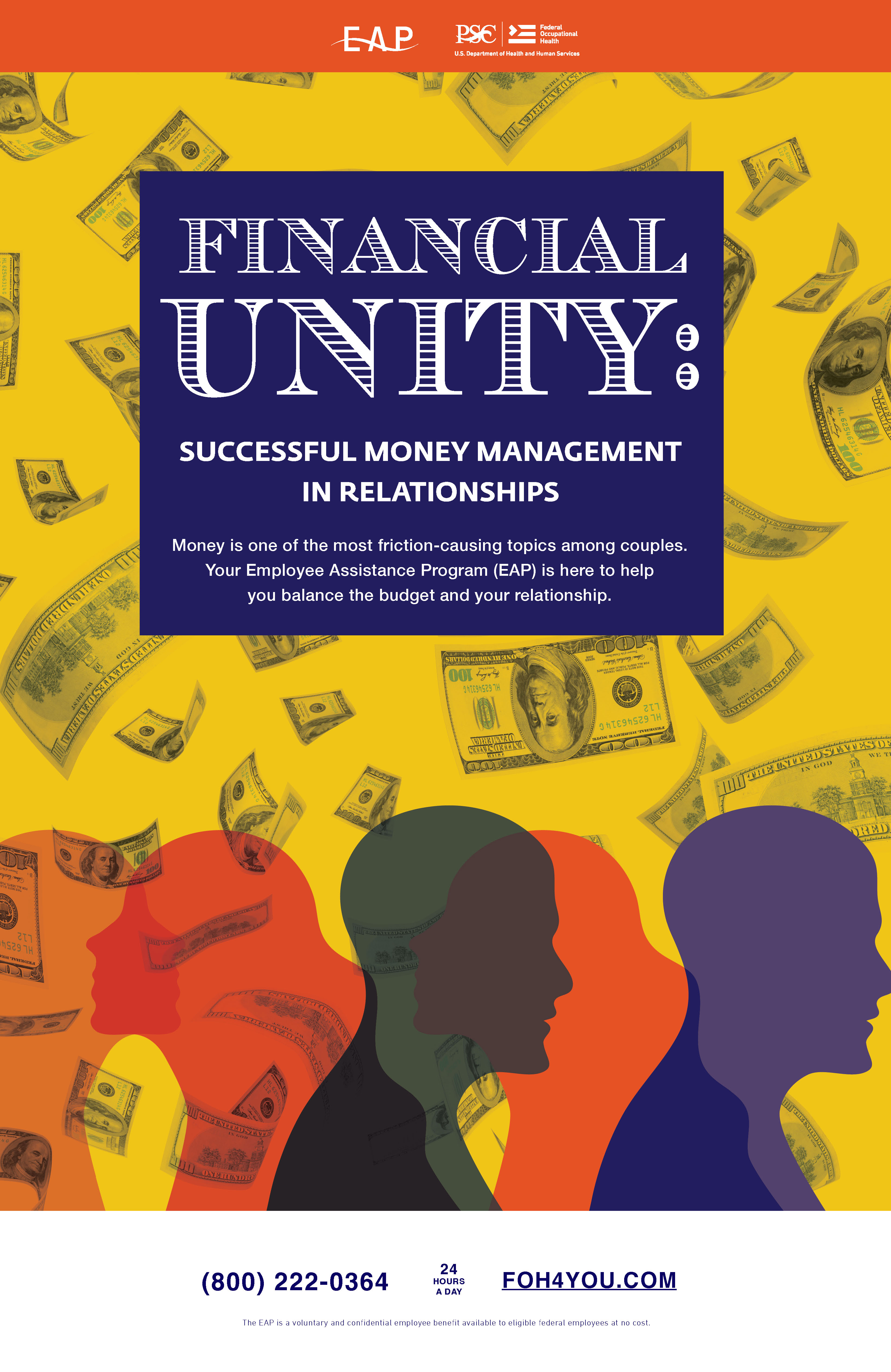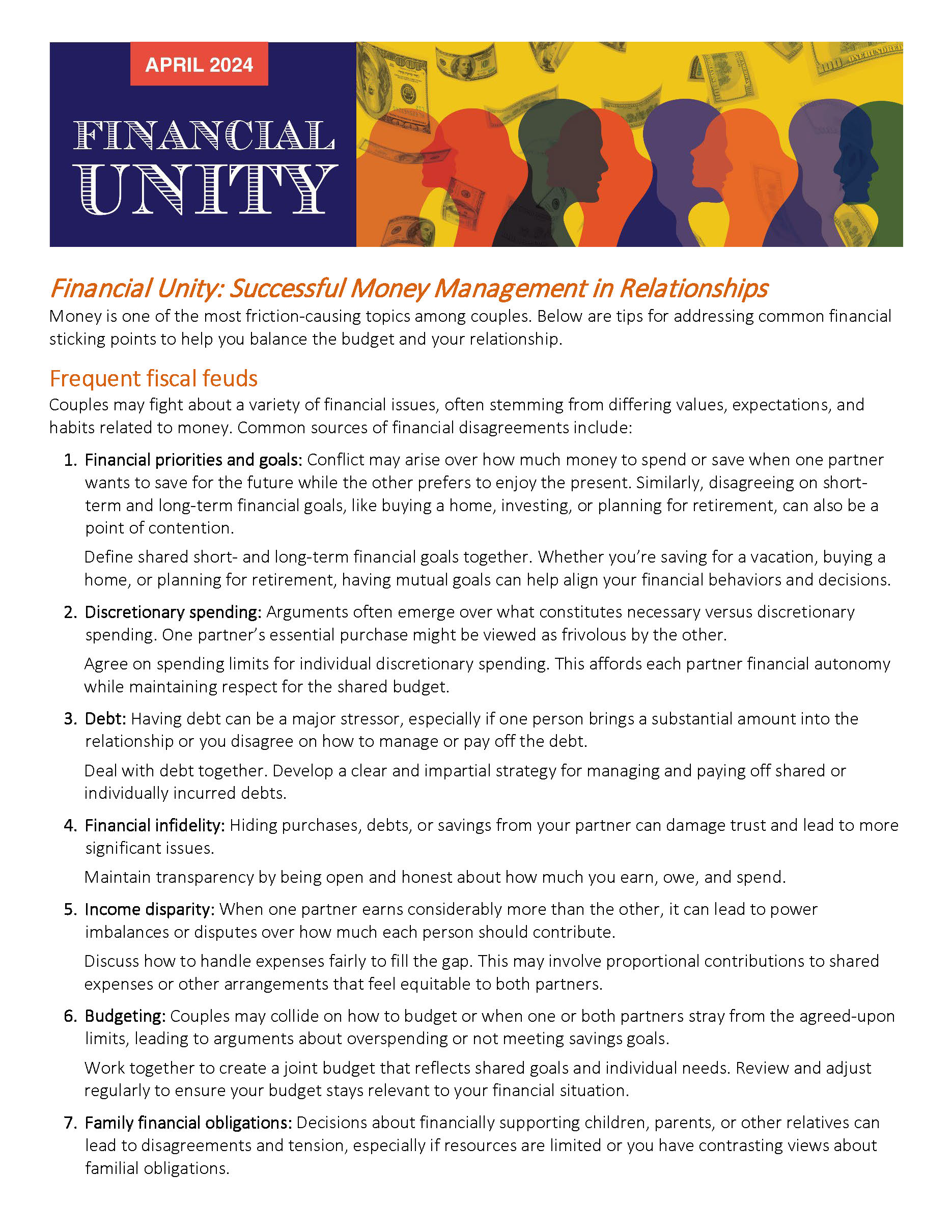
Money is one of the most friction-causing topics among couples. Below are tips for addressing common financial sticking points to help you balance the budget and your relationship.
Frequent fiscal feuds
Couples may fight about a variety of financial issues, often stemming from differing values, expectations, and habits related to money. Common sources of financial disagreements include:
- Financial priorities and goals: Conflict may arise over how much money to spend or save when one partner wants to save for the future while the other prefers to enjoy the present. Similarly, disagreeing on short-term and long-term financial goals, like buying a home, investing, or planning for retirement, can also be a point of contention.
Define shared short- and long-term financial goals together. Whether you’re saving for a vacation, buying a home, or planning for retirement, having mutual goals can help align your financial behaviors and decisions. - Discretionary spending: Arguments often emerge over what constitutes necessary versus discretionary spending. One partner’s essential purchase might be viewed as frivolous by the other.
Agree on spending limits for individual discretionary spending. This affords each partner financial autonomy while maintaining respect for the shared budget. - Debt: Having debt can be a major stressor, especially if one person brings a substantial amount into the relationship or you disagree on how to manage or pay off the debt.
Deal with debt together. Develop a clear and impartial strategy for managing and paying off shared or individually incurred debts. - Financial infidelity: Hiding purchases, debts, or savings from your partner can damage trust and lead to more significant issues.
Maintain transparency by being open and honest about how much you earn, owe, and spend. - Income disparity: When one partner earns considerably more than the other, it can lead to power imbalances or disputes over how much each person should contribute.
Discuss how to handle expenses fairly to fill the gap. This may involve proportional contributions to shared expenses or other arrangements that feel equitable to both partners. - Budgeting: Couples may collide on how to budget or when one or both partners stray from the agreed-upon limits, leading to arguments about overspending or not meeting savings goals.
Work together to create a joint budget that reflects shared goals and individual needs. Review and adjust regularly to ensure your budget stays relevant to your financial situation. - Family financial obligations: Decisions about financially supporting children, parents, or other relatives can lead to disagreements and tension, especially if resources are limited or you have contrasting views about familial obligations.
Start with an open and honest discussion to better understand each other’s money mindset. Often, attitudes toward money and family are deeply rooted in one’s upbringing and cultural background. Demonstrate empathy and patience by appreciating where your partner is coming from. Then, set boundaries for what is acceptable and what isn’t when it comes to supporting family members. This might include how much you are willing to give, how often, and under what circumstances. - Financial control: Friction can also occur if one partner feels that the other is too controlling or too lax about the household finances.
Initiate a non-confrontational conversation about your financial concerns. Expressing your feelings and perceptions without blaming or criticizing your partner is essential. Use “I” statements to convey your feelings, such as, “I feel worried when ...” - Lifestyle choices: Differences in lifestyle desires, such as the type of home, car, vacations, or even which school your children should attend, can strain a couple’s finances and lead to disagreements.
Discuss your financial preferences, desires, and expectations. Be honest about what you value and why it’s important to you. Prioritize and compromise, recognizing that you may not be able to fulfill every want, especially if resources are limited. Decide together what to focus on first and be willing to make concessions on less important aspects to ensure harmony and financial stability.
Settling up with each other
As you can see, addressing financial disagreements requires a combination of communication, understanding, and practical monetary management strategies. Here are some additional recommendations for contending with financial conflicts through honesty, empathy, and compromise:
- Establish a routine for discussing finances: Commit to maintaining a safe space where both partners feel comfortable expressing their opinions and concerns candidly and without judgment.
- Assess and adjust regularly: Life changes, and so do financial situations. Periodically review your financial plan, budget, and goals to ensure they still align with your circumstances and priorities.
- Learn and grow together: Consider taking financial literacy courses or workshops together. Understanding financial basics can improve your joint decision-making and reduce misunderstandings.
- Consult a financial advisor: For complex financial decisions or persistent disagreements, consider seeking advice from a financial professional who can provide objective guidance and help you make informed decisions.
By working together as a team to understand and address these conflicts proactively, you and your partner can navigate financial challenges more effectively and build and maintain a healthy relationship where financial harmony is a shared goal.
Download the Campaign
|
For additional guidance for managing your relationship concerns, money issues, or both, contact your Employee Assistance Program (EAP). Consultants are available 24 hours a day, seven days a week, to assess your needs and connect you to supportive resources and information, including financial services if needed. 24 HOURS A DAY
The EAP is a voluntary and confidential employee benefit available to eligible federal employees at no cost. |






